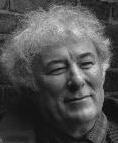 Winner of the Nobel Prize in 1995, Seamus Heaney is an Irish poet of enormous range. His poetry takes up difficult themes: Heaney penetrates to the heart what it is to live in the later twentieth century. But he does so in a voice which is always lyrical and always –surprisingly — accessible. Having grown up in Northern Ireland, Heaney does not shirk the difficult questions of living in a world which is shaped by both violence and beauty, by the presentness of the past and the possibilities we can shape our own future. His poetry often meditates on the relation between the political and the personal, on the difficult intersection where history and individual consciousness meet. The rare combination of music and historical interrogation work together to make Heaney, in my view, the finest poet writing in English today.
Winner of the Nobel Prize in 1995, Seamus Heaney is an Irish poet of enormous range. His poetry takes up difficult themes: Heaney penetrates to the heart what it is to live in the later twentieth century. But he does so in a voice which is always lyrical and always –surprisingly — accessible. Having grown up in Northern Ireland, Heaney does not shirk the difficult questions of living in a world which is shaped by both violence and beauty, by the presentness of the past and the possibilities we can shape our own future. His poetry often meditates on the relation between the political and the personal, on the difficult intersection where history and individual consciousness meet. The rare combination of music and historical interrogation work together to make Heaney, in my view, the finest poet writing in English today.
To explore the poetry of Seamus Heaney, click on this photograph of him.
Click on the photograph of Heaney to hear a talk about Seamus Heaney and four of his poems:
Singing School: # 4, Summer 1969
Station Island: VII, “I had come to the edge of the water”
The Strand at Lough Beg
Station Island: VIII, “Black water. White waves. Furrows snowcapped.”
These poems, and of course many others, can be found in:
Seamus Heaney: Selected Poems 1966-1987 published by
Noonday Press of Farrar, Straus and Giroux in 1990. Seamus Heaney 1939, on a farm in Mossbawn, which is in the North of Ireland. His schholing was all in the North, from grade school through college degrees from Queen’s College, Belfast and St. Joseph’s College in Belfast. he became a teacher, and began at the same time to write poetry.
His books are Death of a Naturalist (1967), Door into the Dark (1969), Wintering Out (1972), Stations (1975), North (1975), Field Work (1979), Sweeney Astray (1983), Station Island (1984), The Haw Lantern (1987), Selected Poems (1990), Seeing Things (1991), Door into the Dark (1995), The Spirit Level (1996), and Opened Ground: Selected Poems 1966-1996. He has published essays in three collections: Preoccupations (1981), The Government of the Tongue (1990), and The Redress of Poetry (1995).
He won the Nobel Prize in Literature in 1995. He was elected Professor of Poetry at Oxford and Boylston Professor of Rhetoric and Oratory at Harvard.
His Nobel Prize Lecture,“Crediting Poetry”, is available on line to those who click on the title in this line.

